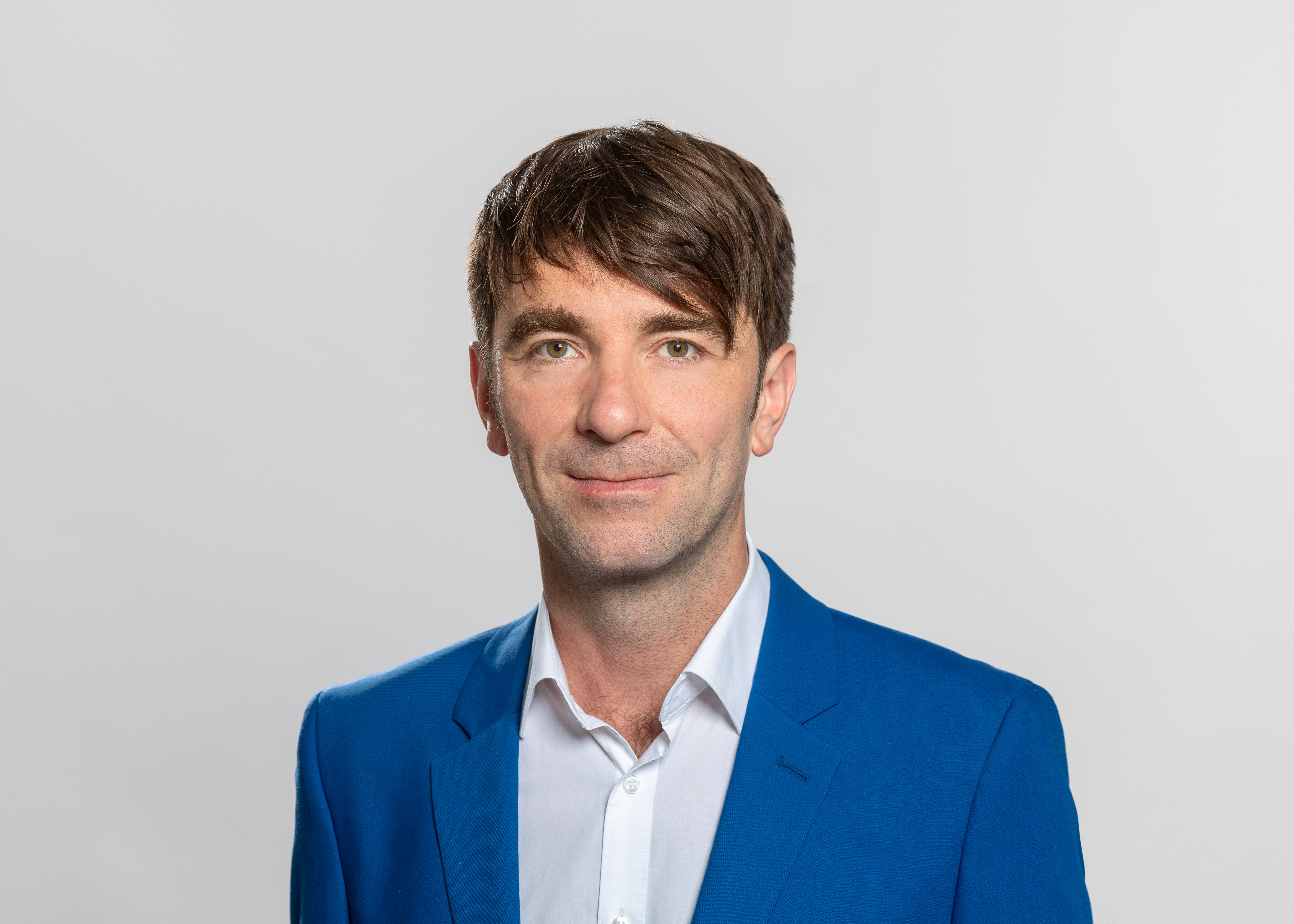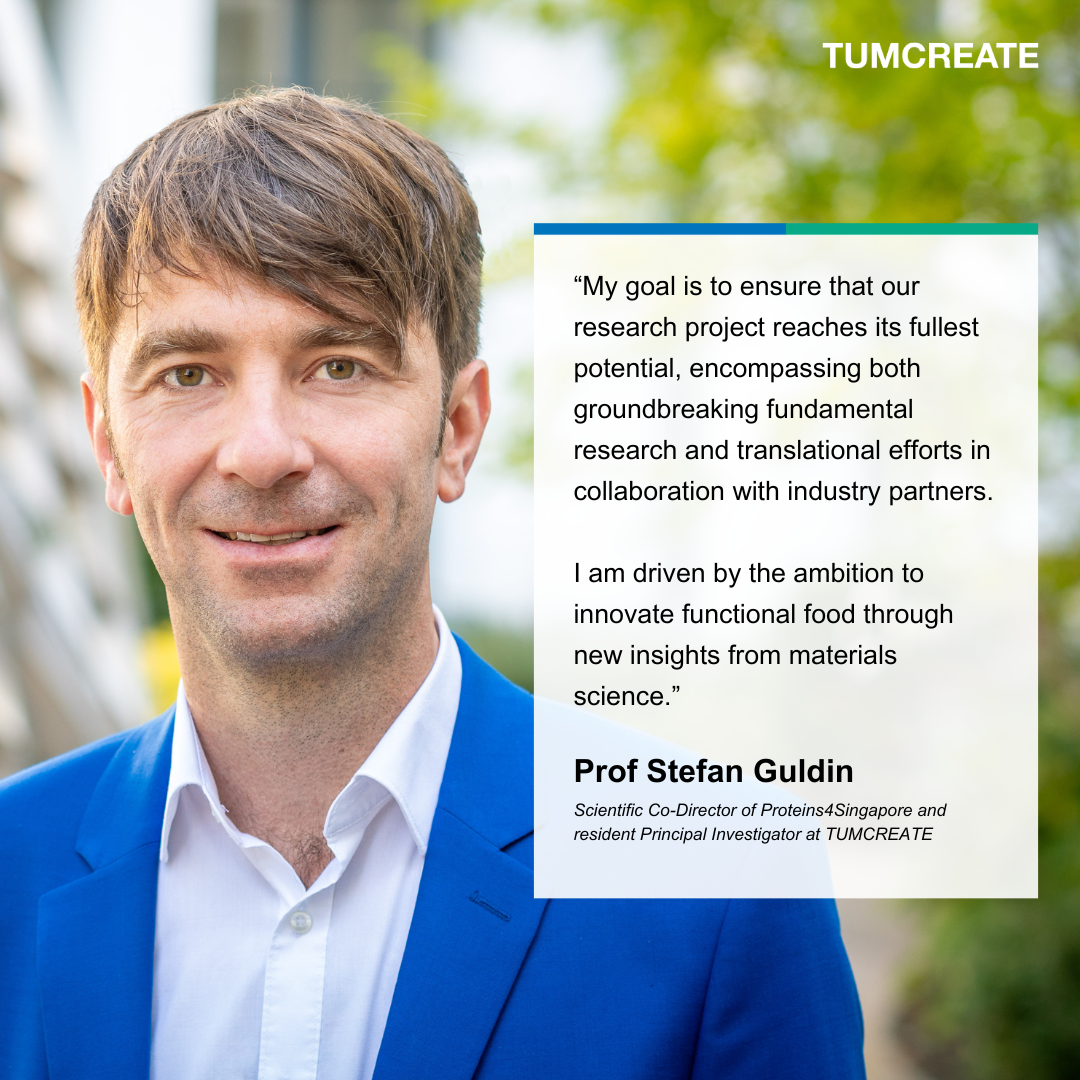- AquaCycle
- Proteins4Singapore
- Singapore's Pathway to Carbon Neutrality
- CellFACE
- LightSPAN
- Computational Modelling Group
- Energy and Power Systems Group
- SITEM - Singapore Integrated Transport and Energy Model
- MoVES (Mobility in Vehicular Environments at Scale) lab
- Projects
News

Bridging Material Science and Food Innovation at TUMCREATE: Meet Prof Stefan Guldin
28.10.2024Prof Stefan Guldin, Chair of Complex Soft Matter at Technical University of Munich (TUM) and Scientific Co-Director of Proteins4Singapore and resident Principal Investigator at TUMCREATE, is at the forefront of a new wave of research that merges material science with food innovation.
Based at TUMCREATE, a multidisciplinary research platform of TUM at the Singapore Campus for Research Excellence and Technological Enterprise (CREATE), Prof Guldin is spearheading research initiatives that reshapes the future of alternative proteins and food security.
The accomplished TUM alumnus and Fellow of the Institute of Physics and the Royal Society of Chemistry is eager to bring his extensive experience in material science to address one of the world's most pressing challenges: sustainable food production.
His involvement in the Proteins4Singapore project aims to contribute to Singapore's '30 by 30' goal, which seeks to produce 30% of the nation's nutritional needs locally by 2030 (Singapore Food Agency; Our Food Future).
We sat down with him to discuss his vision for the Proteins4Singapore project and his role in supporting Singapore’s ambitious ‘30 by 30’ goal since joining us in August.

Welcome on board to TUMCREATE. Please tell us more about yourself and your background.
I studied physics, specialising in biophysics and soft matter at TUM and did my PhD in nanomaterials science and molecular self-assembly at the University of Cambridge. After graduating, I pursued postdoctoral research as a fellow of the German Academy of Science at École Polytechnique Fédérale de Lausanne (EPFL) in Switzerland before becoming principal investigator and head of the Adaptive and Responsive Nanomaterials Group at University College London (UCL) in 2015. I was promoted to associate professor in 2018 and full professor in 2022.
What are some areas of your research interest?
My research spans multiple aspects of material science across multiple length scales such as nano and micro. I have long been fascinated by nanoscale building blocks and how they can be arranged into functional material architectures by themselves using principles of molecular self-assembly, a mechanism for structure formation often found in nature. During my time in London, my team and I applied these principles across various research topics including biosensors to functional coatings, and new novel drug delivery methods. I am now excited to bring these broadly applicable concepts of material science into food science through our work on Proteins4Singapore research project.
What sparked the move to TUMCREATE and Singapore?
What attracted me to TUMCREATE and fascinates me about research in Singapore is people pursuing bold ideas in large multidisciplinary research teams. Singapore offers a unique research landscape, characterised by its long-term vision supported by robust funding mechanisms. Food science, particularly in the context of alternative proteins, is an exciting frontier of materials science, and I am eager to contribute to this dynamic area with my expertise.
What motivated you to apply for the opportunity at TUMCREATE?
While I was working at some of the world’s leading research institutions including Cambridge, Cornell, EPFL and UCL, I closely monitored the research scene in Germany. I was excited and honoured when I was approached to take on the opportunity at TUM and TUMCREATE. I feel very privileged now to be here in Singapore and become a member of this amazing research community.
You were admitted as a Fellow of The Royal Society of Chemistry in the UK last year. Could you share more about this significant achievement?
Fellows are admitted based on their academic merits, and in my case, a notable factor were my contributions on fundamental aspects of materials self-assembly and novel characterisation techniques to study bio-nano interfaces. I also co-founded Vesynta, a medical technology company where we successfully translated our lab innovations into a commercial venture, highlighting the relevance and real-world impact on our academic research.
What's one highlight of your career so far?
Being selected to present at The Royal Society's prestigious summer science exhibition in the UK last year was certainly one of the highlights. This is one of the world’s oldest and well known events for researchers and institutions to showcase science to the public, with only nine research teams chosen annually. It was incredibly rewarding to share ChromaDose, our drug monitoring technology that calculates how much cancer medicine is in a patient’s blood with the public, industry leaders, policymakers, and esteemed Fellows of The Royal Society.
What do you hope to achieve at TUMCREATE?
My goal is to ensure that our research project reaches its fullest potential, encompassing both groundbreaking fundamental research and translational efforts in collaboration with industry partners. I am driven by the ambition to innovate functional food through new insights from materials science.
If you were not in research or academia, what would you do?
I have always been very interested in technology transfer towards making an impact in industry. To this end, it is particularly inspiring that TUM is globally known for its enterprise activities. Previously at UCL, I served as the deputy head of department where I was responsible for the enterprise agenda. Also coming out of a family of entrepreneurs, I would quite likely work in this domain if I was not in academia.
However, I truly embrace my role as a professor and love doing academic research. This position provides me with opportunities for both fundamental science as well as nurturing technology transfer. Most of all, I enjoy working with young people and fostering their growth and development.
Was it your childhood dream to go into research or be a scientist?
No, I come from a 150-year-old family business in the sport industry. No one in my family had any higher education. While I enjoyed the academic pursuits of my foundational years in school, I never anticipated a career path as a researcher or scientist.
Was there a particular moment or experience that piqued your interest in pursuing a career in research?
As a student, I was always up for the academic challenge but I did not really know what I could do after graduating. My deep passion for research sparked when I conducted my final year undergraduate research project in Cambridge. Since then, I never wanted to do anything else.
What are your hobbies or interest outside of work?
I love spending time with my wife and three children. We look forwards to hiking, exploring the city and South-East Asia. I also enjoy the mountains and the ocean and I'm looking forward to taking my surfboard to some of the excellent waves in this part of the world.
Contact:
Corporate Communications TUMCREATE
1 CREATE Way
#10-02 CREATE Tower
Singapore 138602Media and Communications
communications@tum-create.edu.sg

